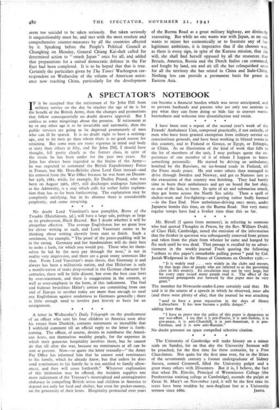A SPECTATOR'S NOTEBOOK I F it be accepted that the retirement
of Sir John Dill from military service on the day he reaches the age of 6o is for the benefit of the British Army, then the changes and promotions that follow consequentially no doubt deserve approval. But I confess to some misgivings about the premiss. If retirement at 6o or any other age is to be invariable and automatic, then the public services are going to be deprived prematurely of men who can ill be spared. It is no doubt right to have a retiring- age, and to let men go then whom there is no good reason for retaining. But some men are more vigorous in mind and body at sixty than others at fifty, and Sir John Dill, I should have thought, fell pretty clearly in the former class, in spite of the strain he has been under for the past two years. Sir John has always been regarded as the brains of the Army— he was expected to command the British Expeditionary Force. in France, but Mr. Hore-Belisha chose Lord Gort instead—and his removal from the War Office because he was born on Decem- ber 25th, 1881, while, for example, Sir Dudley Pound, who was born on August 29th, 1877, still discharges analogous functions at the Admiralty, is a step which calls for rather fuller explana- tion than has so far been forthcoming. The •explanation may be completely satisfying, but in its absence there is considerable perplexity, and _ some misgiving.
* *
*


























 Previous page
Previous page